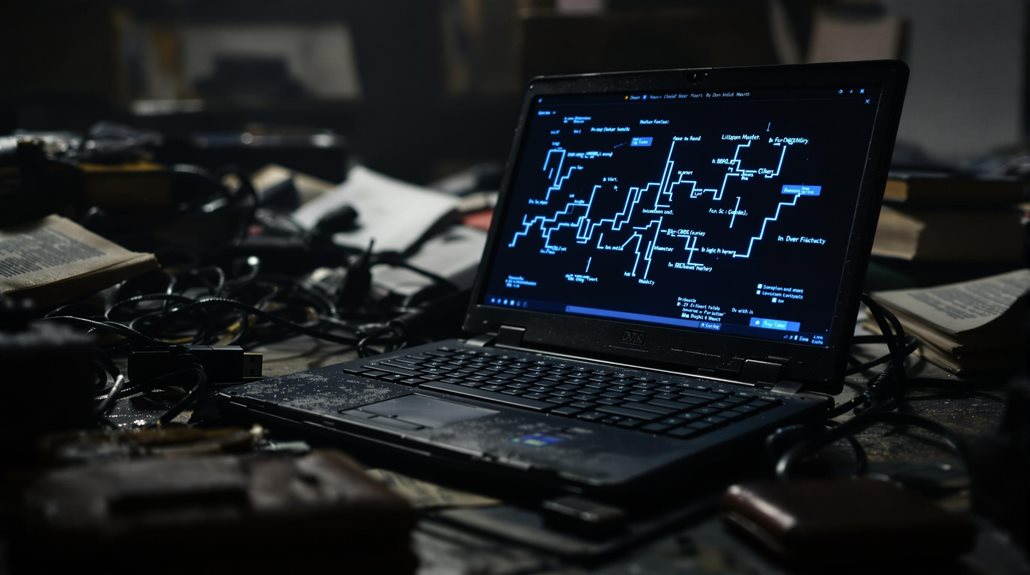Lost bitcoins can be found through several recovery methods. Users often start by searching old hard drives and checking email accounts for wallet backups. Some people use data recovery tools like Recuva to scan devices for deleted wallet files. Professional recovery services exist that specialize in retrieving lost cryptocurrency, with success rates up to 35%. Hardware wallet manufacturers and blockchain forensics firms also provide recovery assistance. There's more to discover about each recovery approach and available resources.

Ever wondered what happens to those Bitcoin fortunes that slip through the digital cracks? Lost bitcoins aren't necessarily gone forever, and there are several ways people try to track them down. Many Bitcoin users have discovered their old digital wealth by searching through forgotten computer files and storage devices.
The first place most people look is their old hard drives and external storage devices. They search for files named "wallet.dat" and use special data recovery tools like Recuva or TestDisk to find deleted wallet files. Professional services typically offer no data, no charge policies to protect clients from unnecessary expenses. Some users have found success by searching their old email accounts, where they might have stored wallet backups or transaction records. Browser bookmarks and history can also reveal forgotten Bitcoin wallet websites.
When self-recovery attempts don't work, professional services step in to help. Companies like Wallet Recovery Services and KeychainX specialize in cracking encrypted wallets. These services work with various cryptocurrencies, including Bitcoin and Ethereum. While their success rates vary, some claim they can recover up to 35% of lost wallets. These services typically charge between 5% and 20% of any recovered funds.
For those who have their seed phrases or private keys, recovery becomes much simpler. Users can input their 12, 18, or 24-word seed phrase into compatible wallet software to regain access. Private keys can be imported into wallet programs like Electrum. Some people who've forgotten their exact passwords have found success by trying different variations of potential passwords they might have used.
Blockchain forensics offers another path to tracking down lost bitcoins. People use block explorers to follow their known Bitcoin addresses and trace transaction histories. Some hire blockchain forensics firms for more complex cases. Old email receipts and exchange records can be cross-referenced with blockchain data to help locate lost funds. In cases where funds were accidentally sent to wrong addresses, some exchanges may help with recovery efforts.
Hardware wallet manufacturers sometimes offer support for recovery through their customer service channels. Bitcoin Core wallets can be restored using backed-up wallet.dat files.
The cryptocurrency community has developed various tools and services over the years to address the common problem of lost digital assets. While not every lost bitcoin can be recovered, these methods have helped many users reconnect with their misplaced crypto wealth.
Frequently Asked Questions
How Can I Prove Ownership of Lost Bitcoins Without My Private Key?
Proving Bitcoin ownership without a private key isn't 100% certain.
Someone can show old transaction records, email receipts from exchanges, or wallet screenshots as evidence. They might also demonstrate detailed knowledge of the wallet's history and contents.
While these hints suggest ownership, they don't guarantee it. Only signing a message with the private key provides absolute cryptographic proof of Bitcoin ownership.
What Happens to Lost Bitcoins in the Overall Cryptocurrency Market?
Lost bitcoins stay on the blockchain but can't be accessed or moved, effectively reducing the total supply.
While Bitcoin's maximum supply is 21 million, experts estimate 3-4 million are permanently lost, leaving only 17-18 million actually available.
This reduction in supply can make the remaining bitcoins more scarce, potentially affecting their market value.
The lost coins don't impact how the network functions, but they do contribute to Bitcoin's deflationary nature over time.
Can Blockchain Forensics Help Recover Bitcoins Sent to Wrong Addresses?
Blockchain forensics can trace Bitcoin transactions but can't actually reverse them or recover coins sent to wrong addresses.
While forensics tools can track where the coins went and identify the receiving wallet, getting the funds back depends entirely on the recipient's willingness to return them.
If the recipient won't cooperate, the sender likely won't get their coins back since blockchain transactions are permanent and irreversible once confirmed.
Are There Insurance Options to Protect Against Future Bitcoin Losses?
There are specialized insurance options for protecting bitcoin holdings. Major insurers like Lloyd's of London offer policies that cover crypto theft and hacking.
Some traditional insurance companies have also adapted their policies to include digital asset protection. Coverage can extend to both individual wallet holders and exchanges.
However, these policies often come with high costs and limitations. They typically don't cover losses from forgotten passwords or market value changes.
How Long Do Lost Bitcoin Recovery Services Typically Take to Work?
Bitcoin recovery services can take anywhere from 24 hours to several months, depending on the situation.
Simple cases might be solved in a day or two, while complex ones can stretch beyond three months.
Password cracking usually takes days to weeks, and hardware wallet recovery typically needs 1-2 weeks.
Professional firms tend to work faster than DIY methods.
The recovery time mostly depends on what caused the loss and the type of wallet involved.





